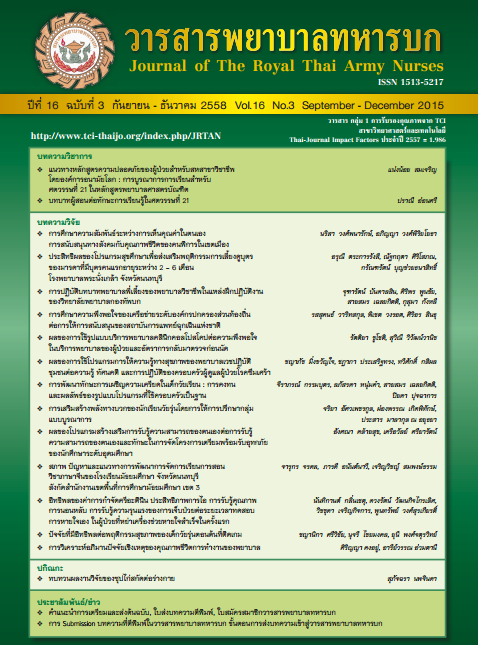ปัจจัยที่มีอิทธิพลต่อพฤติกรรมสุขภาพของเด็กวัยรุ่นตอนต้นที่ติดเกม; Factors Effecting Health Behavior in Early Adolescents of Game Addiction
Keywords:
พฤติกรรมสุขภาพเด็กวัยรุ่นตอนต้นที่ติดเกม, การรับรู้ความสามารถตนเอง, สัมพันธภาพกับเพื่อน, health behavior, early adolescents with game addiction, self-efficacyAbstract
การวิจัยนี้มีวัตถุประสงค์ศึกษาความสัมพันธ์และอิทธิพลของเพศ การรับรู้ความสามารถตนเอง สัมพันธภาพกับเพื่อน และการทำหน้าที่ของครอบครัวต่อพฤติกรรมสุขภาพของเด็กวัยรุ่นตอนต้นที่ติดเกม กลุ่มตัวอย่างคือ เด็กวัยรุ่นตอนต้นที่ติดเกมคัดเลือกโดยการสุ่มแบบหลายขั้นตอนจำนวน 141 คน เครื่องมือประกอบด้วย แบบสอบถามการรับรู้ความสามารถของตนเองแบบสอบถามสัมพันธภาพกับเพื่อน แบบสอบถามการทำหน้าที่ครอบครัวและแบบสอบถามพฤติกรรมสุขภาพ วิเคราะห์ข้อมูลโดยการหาค่าความถี่ ร้อยละ ค่าเฉลี่ย ส่วนเบี่ยงเบนมาตรฐาน พิสัย สถิติสหสัมพันธ์พอยซ์ไบซีเรียล สถิติสหสัมพันธ์ของเพียร์สันและการวิเคราะห์ถดถอยพหุคูณแบบขั้นตอน ผลการวิจัยพบว่าการรับรู้ความสามารถตนเอง เพศ และสัมพันธภาพกับเพื่อนสามารถทำนายพฤติกรรมสุขภาพของเด็กวัยรุ่นตอนต้นที่ติดเกมได้อย่างมีนัยสำคัญทางสถิติร้อยละ 15.1 (Adjust R2 = .132, F3,137 = 8.120, p < .001) ส่วนการทำหน้าที่ของครอบครัว ไม่สามารถทำนายพฤติกรรมสุขภาพของเด็กวัยรุ่นตอนต้นที่ติดเกมได้ผลการศึกษาครั้งนี้มีข้อเสนอแนะว่าพยาบาลหรือผู้ดูแลสุขภาพเด็กวัยรุ่นตอนต้นที่ติดเกมควรนำผลการวิจัยไปใช้เป็นแนวทางในการพัฒนากิจกรรมหรือโปรแกรมส่งเสริมการรับรู้ความสามารถตนเองและสัมพันธภาพกับเพื่อน โดยเน้นในเด็กวัยรุ่นชาย อันจะส่งผลให้เด็กวัยรุ่นที่ติดเกม มีพฤติกรรมสุขภาพที่เหมาะสมยิ่งขึ้น
The purposes of this research were to examine relationships and determine influencing factors of child gender, self-efficacy, peer relationship, family function on health behavior in early adolescents of game addiction. Sample was recruited through multi-stage random sampling. There included 141 early adolescents with game addiction. Research instruments consisted of the child self-efficacy questionnaire, the peer relationship questionnaire, the family function questionnaire and the child health behavior questionnaire. Data were analyzed by using frequency, percent, mean, standard deviation, range, Point bi-serial coefficient, Pearson’s correlation coefficient and stepwise multiple regression analysis.
Results revealed that child self-efficacy, gender and peer relationship significantly predicted health behavior in early adolescents with game addiction, and accounted for 15.1%(Adjust R2 = .132, F 3,137 = 8.120, p < .001) in the prediction. However, family function did not predict. These findings suggest that nurse and health care provider for early adolescents with game addiction should apply these results to develop activities or an intervention to promote child self-efficacy and peer relationship, focusing on male early adolescents. Consequently, early adolescents with game addiction would have increase health behavior.
Downloads
Downloads
How to Cite
Issue
Section
License
บทความหรือข้อคิดเห็นใดใดที่ปรากฏในวารสารพยาบาลทหารบกเป็นวรรณกรรมของผู้เขียน ซึ่งบรรณาธิการหรือสมาคมพยาบาลทหารบก ไม่จำเป็นต้องเห็นด้วย
บทความที่ได้รับการตีพิมพ์เป็นลิขสิทธิ์ของวารสารพยาบาลทหารบก
The ideas and opinions expressed in the Journal of The Royal Thai Army Nurses are those of the authors and not necessarily those
of the editor or Royal Thai Army Nurses Association.






